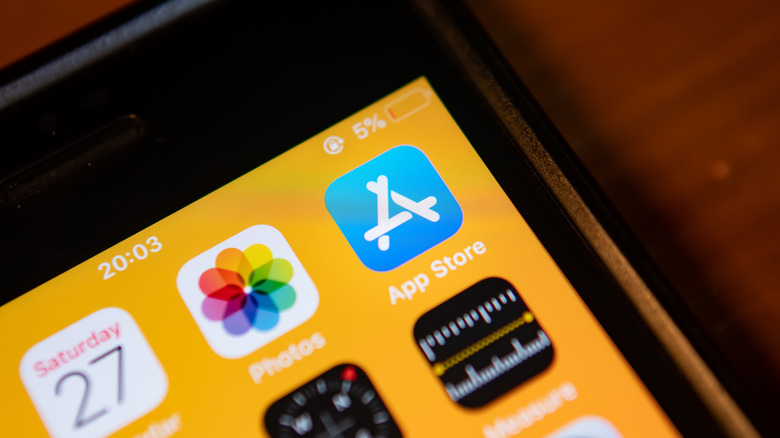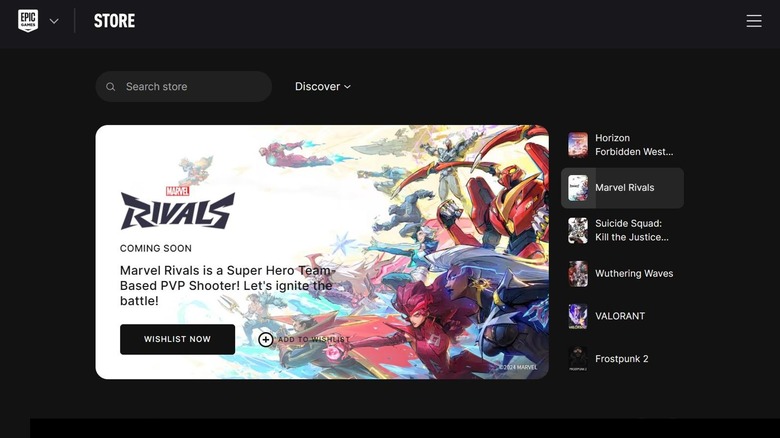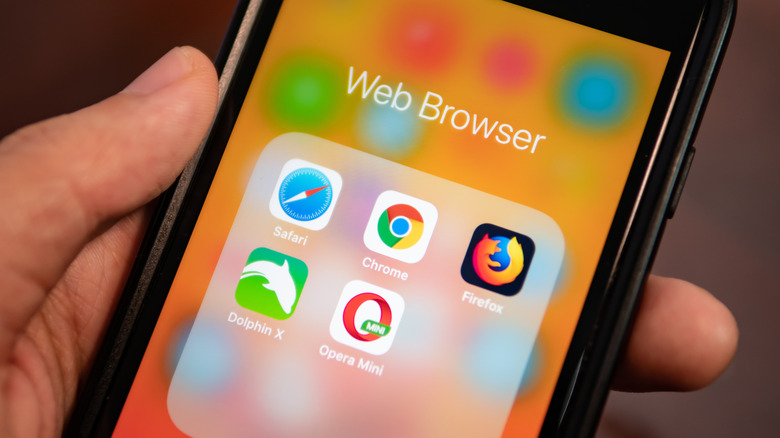Everything To Know About Apple's App Store Changes In 2024
In compliance with the EU's Digital Markets Act (DMA), Apple has recently made some significant changes as of its iOS 17.4 update. Announced in January, the major Apple update will revolutionize the App Store, welcoming a new host of apps and more options for developers.
Over the years, many companies, including the music streaming giant Spotify, have been skeptical of Apple's commission structures and other practices. Now, Apple has been forced to take action by the DMA, which aims to ensure that digital markets are fair and open to businesses and users. One of the regulations includes allowing third-party app downloads and app stores — something Epic Games (creator of "Fortnite") has been fighting for a long time. Despite Apple's sideloading argument, the tech company is also allowing other browser engines outside the one it has used for years, welcoming an improved web browsing experience to users in the EU.
Many of the changes took effect as of March 2024, but it will likely take some time to see all the changes implemented. Buckle up as we explore everything to know about Apple's App Store changes in 2024.
Third-party app stores are allowed for the first time
Apple's first major change is the allowance of third-party app stores on iOS devices in the EU. This will allow iOS users to download apps not created or managed by Apple to their iPhones for the first time.
Android users will recognize the several third-party app stores separate from Google Play, such as the Galaxy Store. Now, iOS users will have the choice to install apps from an alternative app store in iOS 17.4 or later. To prioritize safety, alternate app stores will be reviewed by Apple before becoming available. However, individual apps won't be reviewed, welcoming the choice of downloading an app that doesn't comply with Apple's App Store guidelines.
The German marketplace Mobivention, targeted toward businesses and employers, was the first third-party app store to arrive on iOS in March 2024. Other upcoming stores include Epic Games and MacPaw's sophisticated Setapp marketplace. The approval of third-party app stores is a game-changer for iOS fans set to welcome a diverse and interesting range of apps in the EU.
Apps can now use alternative browser engines
Safari is the bread and butter of web browsers for Apple users. But with the arrival of iOS 17.4, users in the EU will be able to use alternative browser engines within iOS apps.
WebKit has been Apple's one-and-only browser engine, underpinning Safari and related iOS apps. While Apple does allow the use of other browsers on the App Store, such as Google Chrome, these browsers are forced to run on WebKit. The result is either lacking or broken features, creating discontent among Apple fans. To make matters worse, WebKit has been shown to be prone to errors, including security bugs.
Thanks to the EU's Digital Markets Act, Apple will now allow developers to use alternative browser engines in apps, stopping WebKit from dominating the iOS space. To ensure user safety, Apple will require developers to meet privacy and security requirements before authorizing alternative browser engines. iOS users will be prompted with the option to change the default browser when opening Safari.
Game streaming options are now available on the App Store for all users
For a long time, Apple has banned game streaming services, such as Microsoft's Project xCloud (now known as Xbox Cloud Gaming), and recently shut down Google Stadia. Tensions continued after Apple suspended Epic Games' developer account back in early March 2024.
In a similar move to third-party app stores, Apple is now allowing developers to submit apps with a host of games rather than forcing users to download apps individually, as per DMA guidance, except this option will be available to users worldwide and not just in the EU. This offers a far easier method than what was formerly required (for example, accessing Xbox Cloud Gaming via Safari), giving gamers the freedom they've been longing for.
All game streaming apps will need to be approved by Apple according to its App Store Review Guidelines. This includes the host app's age rating, which must comply with the app's highest age-rated game. Adding to this statement, Apple also announced the allowance of in-app purchases for specific app features, such as chatbots, mini-games, and plug-ins.
It's not good news for developers
While there's plenty to explore for iPhone users, it's not looking as bright for developers. Due to the new Core Technology Fee, Apple will charge developers €0.50 per annual app install after 1 million app installs are reached. While this won't affect smaller businesses, it's likely to harm larger companies or apps that suddenly explode in popularity. To help put mobile developers at ease, Apple has a fee calculator to determine what costs developers can expect.
This isn't the only hurdle developers face. To become an alternative marketplace provider, developers must provide Apple with a €1,000,000 letter of credit from an A-rated financial institution. However, there is a workaround for developers who have been a member of the Apple Developer Program for two years and have achieved over 1 million app installs for a single app in the last year. Developers may have the freedom they were seeking for their toolbox of apps, but it comes at an unwelcoming price.




